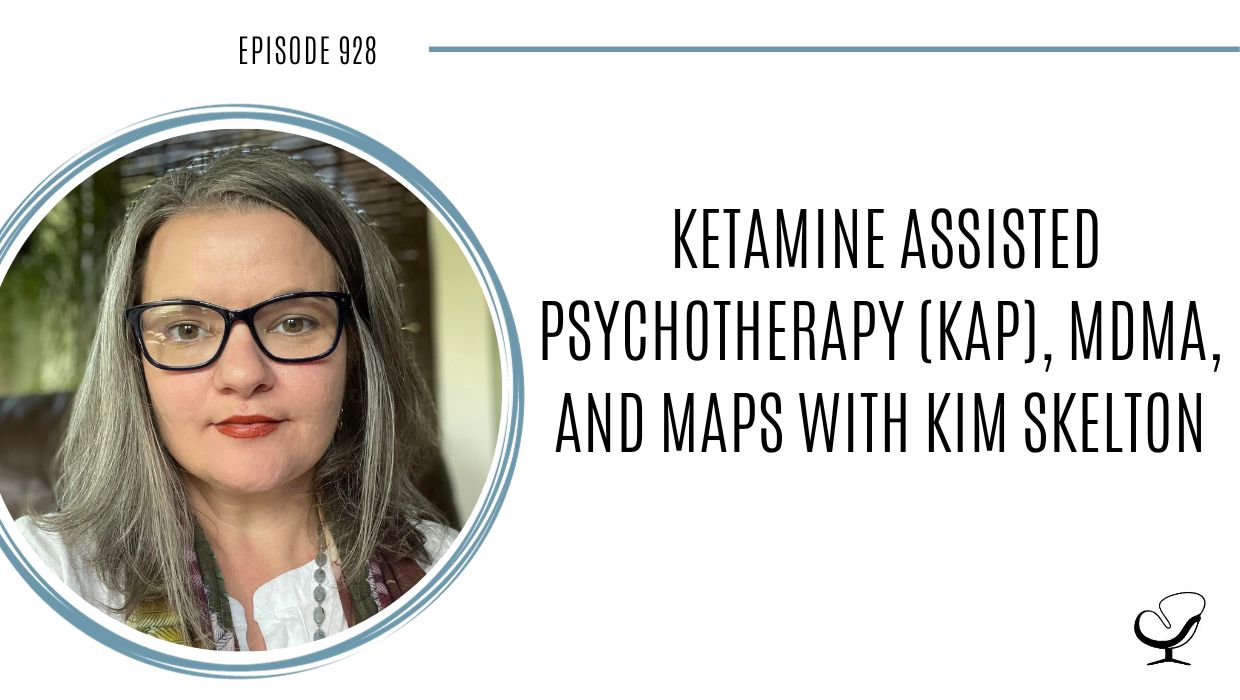Podcast: Play in new window | Download | Embed
How is ketamine-assisted psychotherapy making new headlines in the therapeutic community? What does a typical session of KAP look like?
Which clients are best suited or ill-advised to try this type of modality? In this podcast episode, Andrew Burdette speaks about ketamine-assisted psychotherapy (KAP), MDMA, and MAPS with Kim Skelton.
Podcast Sponsor: Therapy Notes

As a therapist, I can tell you from experience that having the right EHR is an absolute lifeline. I recommend using TherapyNotes. They make billing, scheduling, notetaking, telehealth, and E-prescribe incredibly easy. Best of all, they offer live telephone support that’s available 7 days a week.
You don’t have to take my word for it – Do your own research and see for yourself – TherapyNotes is the #1 highest-rated EHR system available today, with 4.9 out of 5 stars on Trustpilot.com and on Google.
All you have to do is click the link below, or type promo code JOE on their website www.therapynotes.com, and receive a special 2-month trial, absolutely free.
If you’re coming from another EHR, TherapyNotes will import your demographic data quickly and easily at no cost, so you can get started right away.
Trust me, don’t waste any more of your time, and try TherapyNotes.
Meet Kim Skelton

Kim Skelton co-founded Widening Circles in 2017 and now serves as the CEO and as a psychotherapist. She is a Licensed Clinical Mental Health Counselor Supervisor and a Licensed Clinical Addictions Specialist. Kim’s areas of special interest include mood and anxiety disorders, trauma and traumatic grief, psychedelic medicine, addictions, gender and orientation concerns, and spirituality. Kim’s treatment orientation is rooted in existential/humanistic psychotherapy; psychedelic-assisted psychotherapy; ecopsychology (“connection with” vs. “power over”); harm reduction psychotherapy; feminist psychotherapy; and EMDR (adaptive resolution of trauma). Kim is a member of the LGBTQIA+ community and enjoys working with issues specific to this population.
Visit Kimberly Skelton’s website and Widening Circles.
In this Podcast
- A medical- or therapy-focused practice?
- What typical ketamine-assisted therapy looks like
- Ketamine basics in the body
- Rule-outs for trying ketamine-assisted therapy
- Information about MAPS
- Kim’s tips to private practitioners
A medical or therapy-focused practice
With psychedelic-assisted psychotherapy … necessarily both components are present at the same time. (Kim Skelton)
In using different drug-assisted modalities for therapy, sometimes the line can blur if a practice is medicine-based but using therapy, or therapy-based with the help of medicine. Both types depend a little on one another, so the line is blurred, and that’s fine.
There are quite a few key differences I think … Namely, in a psychedelic-medicine paradigm, it turns this idea of an all-knowing professional that you go to see completely on its head. (Kim Skelton)
The main difference between a medical- and therapy-based practice is that with psychedelic-assisted psychotherapy, for example, the professional is not leading the conversation, the client is, and even more so than in traditional therapy.
What typical ketamine-assisted therapy looks like
With Kim’s clients, she typically has them:
- Come in for an initial bio-psycho-social assessment
- If the client is deemed a good fit for the therapy, they will undergo a further evaluation with one of their psychiatrists
- If the clients pass that evaluation, they will meet with Kim to do some preparation.
For every single person that comes through their very first KAP session, both the prescriber and the therapist sit in the room with the client, and we’re both there for medical and therapeutic support. (Kim Skelton)
- After the KAP session, there would be an integration session within the next 24-48 hours for the therapist and the client to talk about everything that came up.
Most of the research on ketamine-assisted psychotherapy has shown that major progress often occurs within six sessions or more, so if the initial few sessions go well with the client, they may do up to six.
Ketamine basics in the body
In Kim’s practice, clients can receive intravenous ketamine. They are hooked up to an IV line for 45 minutes to an hour. With the IV, clients get a steady stream the entire time, since other routes of administration can have a significantly stronger boost and come-down effect.
Ketamine is a dissociative anesthetic. When it’s used in anesthesia, we’re looking at more like 8 milligrams per kilogram versus in psychiatric indications it’s much lower, like 0.5 to 1.5. (Kim Skelton)
Other ways of administering ketamine include an intramuscular injection which has a significantly higher and stronger come up and a subsequent come down. Depending on the person’s metabolism, they may hit the peak within 10 minutes.
For a much slower release and onset, there is the option of holding something small like a lozenge in the mouth with ketamine. However, for clients that are susceptible to nausea, this option isn’t advised.
Rule-outs for trying ketamine-assisted therapy
As with any modality, it needs to suit the needs of the person, and not all modalities are safe – either mentally or physically – for all people to try. Folks who you avoid using ketamine-assisted psychotherapy include:
- People with uncontrolled hypertension
- Ongoing urinary tract infections
- People with psychotic symptoms – although more research is needed
- People who have very complex trauma history might need extra support as the loss of ego during the KAP process might be retraumatizing
How does a therapist handle KAP therapy if a client has had substance abuse problems?
I do not feel that using psychedelics therapeutically is a contraindication for someone who is in recovery [but] I wouldn’t do this with someone who is actively using [hard drugs] … I need to know that they are somewhat stable. (Kim Skelton)
Information about MAPS
MAPS stands for the multi-disciplinary association for psychedelic studies. They have spearheaded over the last 20 years the bulk of the research on MDMA that has recently come out.
There are many different organizations across the states where you could get certified and trained in offering psychedelic-assisted therapy. Click the links below to find out more!
Kim’s tips to private practitioners
Read through some of the research that has come out over the recent years, even from 2017. Network with other therapists who are offering these services already because you want to identify who you can authentically learn from and offer these modalities to your niche in ways that can truly serve them.
Begin to align yourself with people that are respected in this field I think is a great place to start. (Kim Skelton)
Sponsors Mentioned in this episode:
- Trust me, don’t waste any more of your time, and try TherapyNotes
- Apply to work with Andrew or one of our other consultants!
Books mentioned in this episode:
Michael Pollan – How to Change Your Mind: The New Science of Psychedelics
Useful links mentioned in this episode:
-
Visit Kimberly Skelton’s website and Widening Circles.
- Check out The Pearl Psychedelic Institute, MAPS, and PRATI.
- Email Joe at [email protected] to suggest guests for the show
Check out these additional resources:
Niching Down and Leaving Insurance Panels with Sarah Mehta | POP 927
Events – click on the event’s dropdown
Sign up to join the free webinars and events here
Practice of the Practice Podcast Network
Free resources to help you start, grow, and scale
Apply to work with us — a decision-making matrix for your next steps
Meet Joe Sanok

Joe Sanok helps counselors to create thriving practices that are the envy of other counselors. He has helped counselors to grow their businesses by 50-500% and is proud of all the private practice owners who are growing their income, influence, and impact on the world. Click here to explore consulting with Joe.
Thanks For Listening!
Feel free to leave a comment below or share the social media below!

